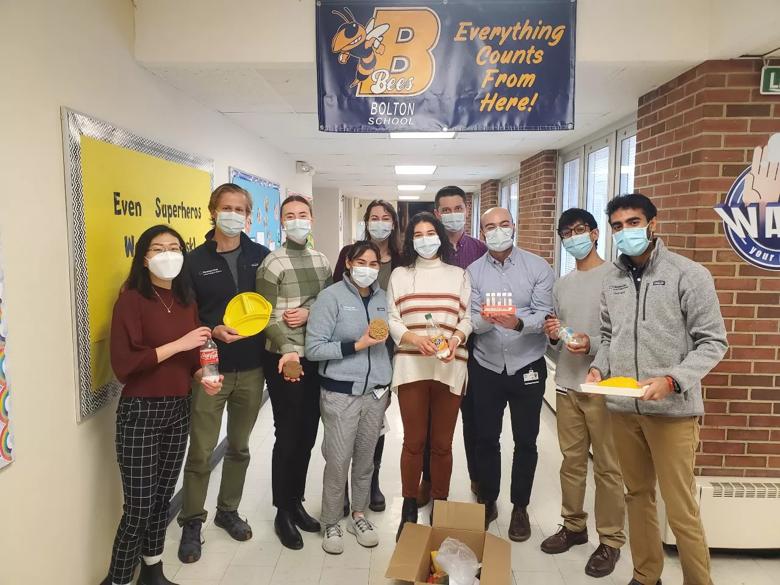CCLCM Students Help Local Children Build Lifelong Healthy Habits

Cleveland Clinic is partnering with the Cleveland Municipal School District to offer supplementary health education to the students of Bolton Elementary School, which serves children from pre-kindergarten through eighth grade.
“The need was identified through a series of conversations between Cleveland Clinic’s Community Health and Partnerships team; Bolton School staff, students and families; and Fairfax Renaissance Development Corporation staff,” says RosaLia Stadler, a program manager with Cleveland Clinic Community Health and Partnerships.
From there, the team developed an action plan that details two supplemental education programs for Bolton School students: 1) mental health and wellness, which is being led by Gerard Banez, PhD, Clinical Assistant Professor of Pediatrics, and his team; and 2) puberty and hygiene education, which is being led by a group of 11 first- and second-year Cleveland Clinic Lerner College of Medicine students:
Student-driven curriculum
The CCLCM students developed the entire curriculum for the puberty and hygiene education program, which is geared toward sixth, seventh and eighth grade students.
In developing the curriculum, the medical students were guided by Cleveland Clinic clinicians and trauma-informed experts with experience designing similar curricula for adolescents including Roopa Thakur, MD, Assistant Professor of Pediatrics; Vanessa Jensen, PsyD, Clinical Assistant Professor of Pediatrics; Veronica Issac, MD, Assistant Professor of Pediatrics; and Jason Lambrese, MD, Assistant Professor of Medicine. Parevi Majmudar, MD, and Neha Solanki, MD, Assistant Professor of Medicine, were instrumental in helping the medical students establish the foundations for this project.
Saswat Sahoo (’25) says he appreciates the collaboration with his peers and how all his fellow medical students brought their personal experiences to build the curriculum.
“Educators often build curricula without thinking about the student needs. Being there with the Bolton students helps us better understand what they need,” he says.
The puberty and hygiene education program, which started in January 2022, comprises six sessions:
If a student isn’t comfortable taking one of the sessions, they can opt out. Likewise, if a parent isn’t comfortable with their student taking a session, they can opt out their student.
Interactive learning
To engage their learners, the CCLCM students use interactive teaching methods. For example, for the handwashing activity, students rub olive oil on their hands and attempt to wash it off using only water. When that doesn’t work, the students add soap, which does the trick. The lesson is that soap is needed to get rid of germs.
During the healthy eating session, students are shown vials of sugar and fat that represent the amounts found in various foods. The students are often stunned at the large quantities of unhealthy ingredients.
The Bolton students help drive the exercise and relaxation session through a “follow the leader” technique. A CCLCM student first walks the class through various exercises, such as push-ups and jumping jacks, and relaxation techniques, such as deep breathing and power poses. Next, a Bolton student volunteers to lead the class through the same exercises, giving that student the opportunity to engage more deeply in the learning and to grow their leadership skills.
Learning assessment is key
Just as important as teaching is assessing what the students have learned. The CCLCM students solicit both verbal and written feedback from the Bolton students.
For example, in sharing how they will incorporate what they learned from the Hand and Oral Hygiene session into their daily lives, one Bolton student noted, “I plan to wash my hands while counting up to 30 seconds.” Another student shared their learning from the Healthy Eating and Nutrition session, commenting, “I was surprised to learn about all of the unhealthy things in fast food.”
“I can see just from the beginning sessions until now that the students are more engaged. They remember who we are, and they’re excited to have us in the classroom,” says Saswat.
Benefits to CCLCM students
This teaching experience has given the CCLCM students an added benefit: enhancing their cultural competency and humility as healthcare providers.
Says Julia Joo (’25), “Bolton is close to Cleveland Clinic, but underserved. This program provides an opportunity for medical students to not only interact with elementary students who we would never normally meet, but also engage with them in a meaningful way.”
The CCLCM student team plans to offer this program to the sixth, seventh and eighth grade students again next school year.

Image content: This image is available to view online.
View image online (https://assets.clevelandclinic.org/transform/cec86e94-20b1-4fa2-9ebc-f22d301aeb99/Bolton-group_1200_jpg)